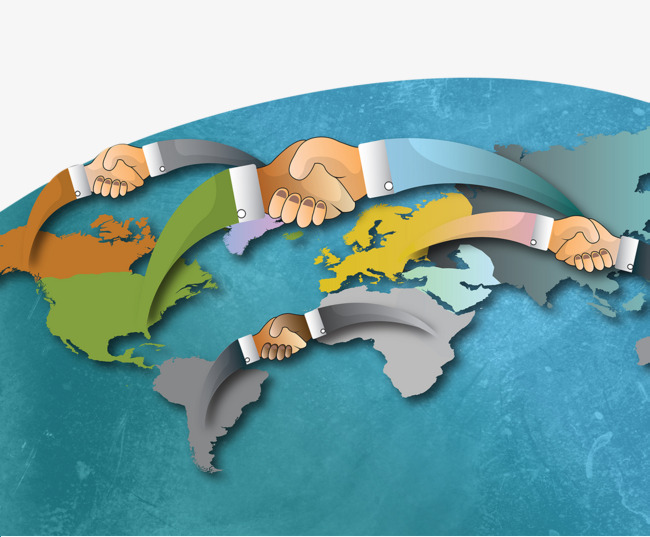New type of int'l relations transcends Western model

As the degree of interdependence among nations is deepening and international issues need to be solved through cooperation, the new type of international relations is a return to the state’s rational duality and unity. (pngtree.com)
Experts had an in-depth discussion on new backgrounds, ideas and practices of building a new type of international relations at a seminar at the University of International Business and Economics on April 21.
The new form of international relations is an important part of Xi Jinping Thought on Socialism with Chinese Characteristics for a New Era. Featuring mutual respect, fairness, justice and win-win cooperation, this idea not only inherits and innovates China’s path toward peaceful development but also carries China’s ideals and pursuit of a beautiful world.
The proposal to build a new type of international relations is based on deep insight into the evolving international situation. Analyzing the current irrational factors in international relations, Cai Tuo, director of the Globalization and Global Issues Institute at the China University of Political Science and Law, said that today’s world has seen the emergence of extreme realism, and the order, mechanism and philosophy of dialogue and cooperation of global governance established in the context of economic globalization since the 1990s have been hit hard. “The admiration of hard power, the disappointment with elite politics and the existing international system, and the anxiety about the uncertainty of the artificial intelligence era all reflect that the international community is now in a period of relatively low tide, chaos and confusion.”
The profound transformation of the international system also provides a practical basis for the construction of a new type of international relations. Although currently economic globalization has suffered setbacks, it has not fundamentally reversed and the general direction of building a new type of international relations is correct, said Dai Changzheng, dean of the School of International Relations at the University of International Business and Economics.
Changes in the balance of world political and economic power, the rise of emerging economies and developing countries in groups, and China’s unprecedented proximity to the center of the world stage provide an opportunity to change the unreasonable factors of the old international system.
Promoting a new type of international relations has transcended the differences between countries, parties and institutions while bringing together the greatest common divisor universally recognized by countries.
Liu Xuelian, director of the Institute of Northeast Asia Geopolitics and Geo-economics of Jilin University, analyzed the innovative ideas of the new type of international relations from the perspective of national rationality. She said that state rationality is essentially the unity of self-interested rationality and public reason.
The state exists to pursue interests, Liu said, but it cannot completely abandon morality and ethics. However, influenced by the Western realism theory, the state tends to place more emphasis on the instrumental rationality and the rationality of self-interest in actual international contacts, ignoring the side of value rationality and public reason.
In the face of new situations in which the degree of interdependence among nations is deepening and international issues need to be solved through cooperation, this concept is becoming increasingly obsolete. Advocating mutual respect, fairness, justice and win-win cooperation, the new type of international relations is a return to the state’s rational duality and unity, and is conducive to reshaping the value rationality and public reason in the national rationality, Liu said.
“The concept of a new type of international relations goes beyond Western international relations theory and provides new thought, perspectives and directions on how to treat international relations,” said Fang Changping, deputy director of the School of International Studies at Renmin University of China.
Realism in Western international relations theory emphasizes the logic of power politics, assuming a strong power will inevitably develop into hegemony, Fang said, adding that this approach is excessively pessimistic about the relations between big powers. At the same time, it is too indifferent to small and medium-sized countries and other social forces.
On the surface, institutionalism presents a practical and feasible approach to international cooperation, but the theoretical logic behind it basically reflects the interests of advanced Western capitalist countries. Developed Western countries came to dominate the majority of the international institutions that took shape after World War II. The hegemony of the system has greatly eroded the interests of the vast number of developing countries and aggravated the uneven development of the center-periphery structure of the world system.
Fang said that while mainstream constructivism increasingly emphasizes the dissemination and internalization of norms, the background knowledge and ideas of the West are embedded in the existing international norms, which means contradictions, conflicts and confrontation with local knowledge and culture will inevitably arise when they are propagated in the international community, thus increasing the instability of the international system. In contrast, the new type of international relations abandons the zero-sum and the Cold War mentality, as well as the mentality of power and the sphere of influence in Western international relations theory. As such, it is conducive to the construction of a truly equal relationship between countries and civilizations, Fang concluded.
Tang Yongsheng, deputy dean of the School of National Security at the National Defence University PLA China, said that the current intensification of competition among major countries adds uncertainty to future global development. The new concepts that China has contributed to the development of international relations must be based on a high level of domestic governance, and guaranteed by continuously enhanced national strength. We must steadily push forward the construction of a new type of international relations with a gradual and progressive mentality rather than rush for quick results, so that more inclusive Chinese concepts can be implemented in the specific practice of international relations, Tang said.
(edited by JIANG HONG)

 PRINT
PRINT CLOSE
CLOSE